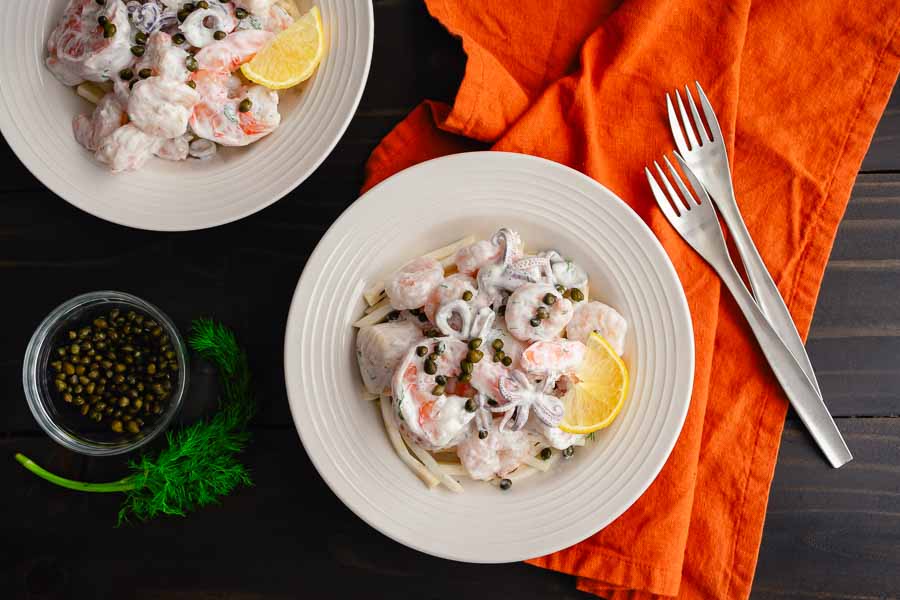I have been in the mood for seafood lately. It’s been a while since I made a seafood recipe, so I went looking for a good one and found this Poached Seafood Salad with Lemon Dill Sauce. It was actually my second choice since the first one I chose had littleneck clams. I tried two stores, and they were both out. Neither had frozen clams (is that a thing?). I was left to search Pinterest for a new one while tucked into a corner of the store, hopefully out of everyone’s way. This recipe looked like a good one and has a new vegetable for me, celery root. And most importantly, no littleneck clams. It might have been my second choice, but I don’t feel like I settled!
A lovely light salad to make anytime of the year, is a plump and juicy Poached Seafood Salad made with large shrimp, scallops, squid and a few tiny salad shrimp for good luck.
The Ingredients
I happened to be at my local Fresh Market when I found this recipe. The ingredients were all things they would stock, but there was one I wasn’t sure of. Celery root isn’t something I have noticed on the shelves, but I haven’t been looking for it since I have never had it. I rolled on over to the produce shelf and sure enough, it was right there.
Tip: Celery root is exactly that, the root bulb of a celery plant. It is a root vegetable that can be eaten raw or cooked. Celery root is also known as celeriac, knob celery, and turnip-root celery, although it is not related to the turnip.
With the celery root in my cart, along with a bunch of dill and a few lemons, I rolled out of produce and up to the seafood counter. Scallops and squid were easy, the shrimp might not have been exactly what the recipe called for. They had colossal shrimp but not the teeny tiny salad shrimp I was picturing in my head. Instead, I went with the smallest shrimp they had, wild American shrimp 31-40 per pound.
Lastly, I picked up a container of sour cream. I knew I had the remaining ingredients on hand, so shopping was done with one trip.
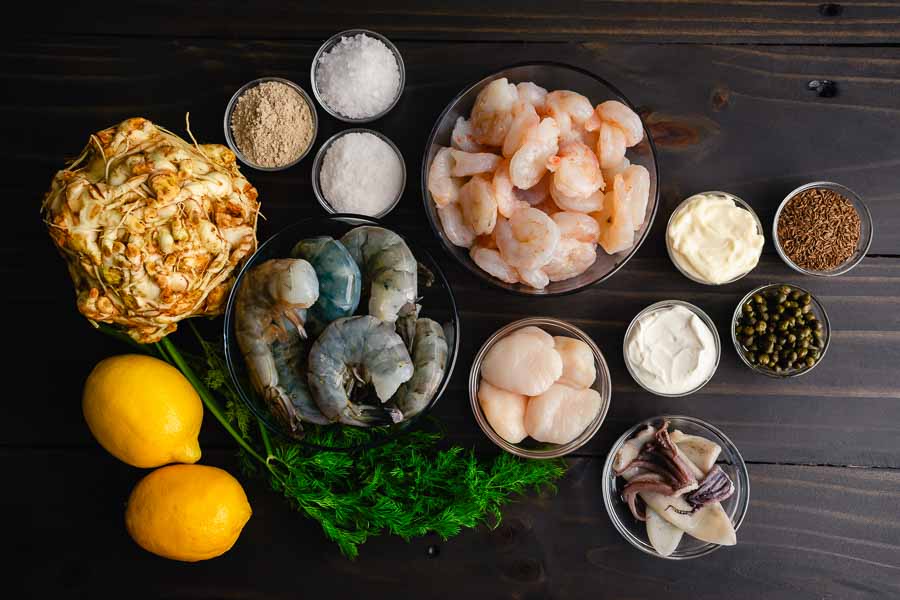
The Process
This recipe is a three-in-one with poaching the shrimp, making the sauce, and making the remoulade. All three were very easy to do even though two were first for me.
This wasn’t my first time poaching seafood, but it was my first time poaching these types of seafood. I love poaching salmon with herbs, white wine, and lemon juice. This was much simpler, though, with plain water. I set a pan on the stove to boil and began my prep work while I waited for it to boil.
All I had to do to prep for this part was peel the colossal shrimp and cut the squid into rings. The tentacles were already separate from the tubes when I bought the squid. I let the water come to a gentle boil for a few minutes and turned the heat down to medium-high (8 out of 10 on an electric stove).
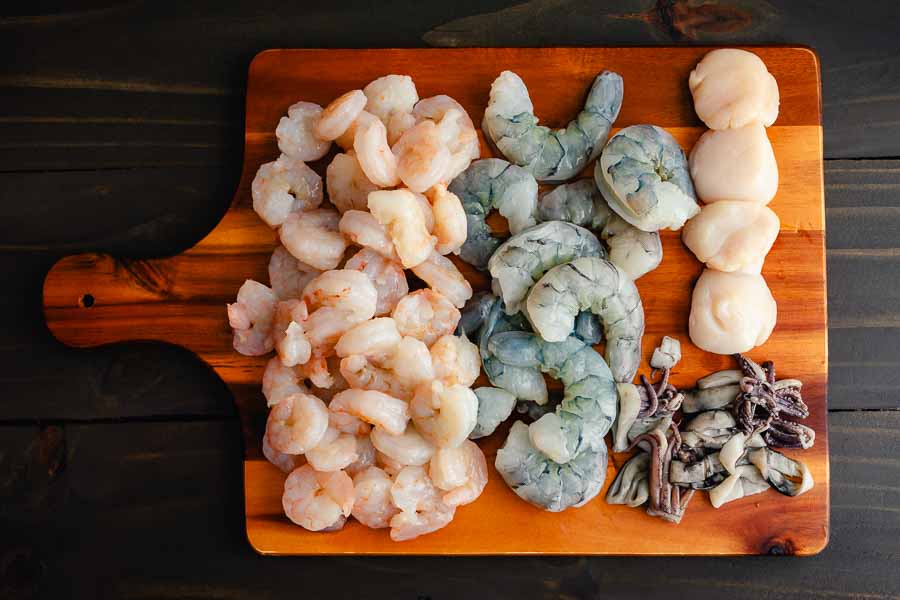
Tip: I used a 2-quart pot filled with about 4 inches of water to poach my seafood, and it had plenty of room.
The water took about 7 minutes to come to a gentle boil with tiny bubbles visible. That left just enough time for me to make the Lemon Dill Sauce as well because it was super simple. I just chopped some dill, combined all the ingredients, and mixed them thoroughly.
Poaching the Seafood
The recipe does not list poaching times, so I took a quick look online and used those times as guidelines. It also says to poach one at a time. I wasn’t sure if that meant one scallop, squid, or shrimp at a time or one type of seafood at a time. I chose the latter.
Tip: Don’t lower the stove’s heat too much once the water begins bubbling. Adding cold seafood will cool the water and can interfere with the cooking process. I compensated for that by keeping the heat at medium-high.
I began with the scallops and let them poach for 90 seconds. The squid was next and took a mere 30 seconds. It was still rubbery despite the short poach. I chalk it up to their small size. One also had some of the ink sack left in the tube that I could not rinse out. It turned the water an opaque grey color and made it hard to see what I was poaching but didn’t seem to change the color or flavor of anything.
Tip: A large skimmer made it easy to add and remove the seafood from the pot. Lowering the seafood into the pot using the skimmer made things safer by preventing splashing.
The colossal shrimp went in next and turned from blue to pink right away. Shrimp turn pink and go opaque when cooked. The colored water made it hard to tell, so I had to keep checking. I let them poach for 2 minutes.
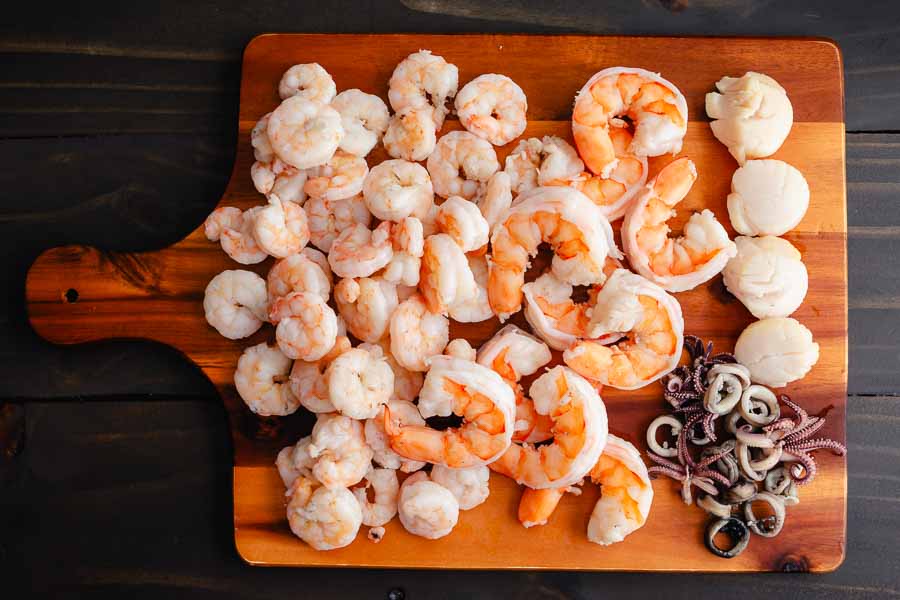
Lastly was the small shrimp. I poached them in 3-4 batches for 30 seconds. The colored water not only made it hard to tell when they were done. It also made it hard to make sure I fished them all out before beginning a new batch. Then I set everything aside and began the remoulade and sauce.
Tip: Be careful not to overcook your seafood and remember it will keep cooking when it’s removed from the pan. You can stop that by running cold water over it or simply cook it for the shortest time possible, remove it from the pan, and allow it to finish cooking in the strainer.
Making the Celeriac Remoulade
The Celeriac Remoulade took a little more effort than the Lemon Dill Sauce. I have never had or prepared celery root so I turned to YouTube to learn how. I found a video that shows how to julienne celery root.
Tip: Celery Root Remoulade is a classic French dish that is similar to coleslaw. Thin strips of celery root are tossed in a mayonnaise-based sauce and served raw. Recipes vary but often include lemon juice, Dijon mustard, capers, and cornichon pickles.
I had scrubbed it thoroughly the day I bought it, so I began by peeling it. The recipe says to use a vegetable peeler, but mine wasn’t up to the task. The outside was tough, and I had to peel with my chef's knife.
Next, I cut the celeriac in half and sliced it thinly with my mandoline. The video shows how to do it with a mandoline and without. The mandoline is great for speed and even thickness, but it’s also very sharp. Be sure to use the handpiece and not your bare hand like the chef in the video!
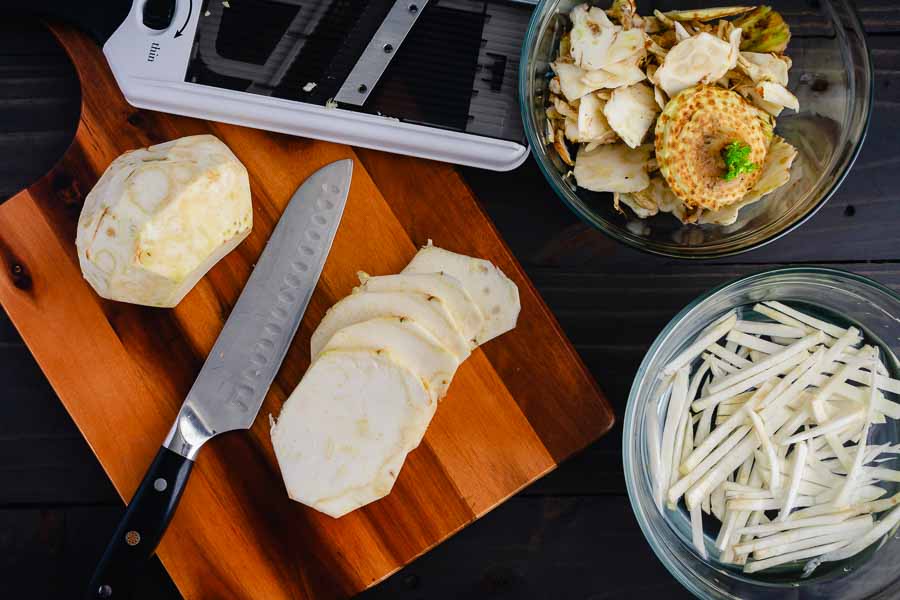
Tip: I put the julienned celery root in a bowl of water to keep it from turning brown, and drained it when I was ready to assemble the remoulade.
Then, much like the Lemon Dill Sauce, I added the rest of the ingredients and stirred to mix and adjusted the seasonings. Not it was time to assemble.
First, I mixed 1/2 cup of the Lemon Dill Sauce with the cooked seafood. Then I placed some of the celeriac remoulade in the bottom of two shallow bowls and topped them with the seafood and a lemon wedge.
Timing
This recipe did not list any times at the top or in the instructions, so I’m not adding a time rating. I did keep track of the time, though, and this is how my time was spent:
- 7 minutes to boil water
- 2 minutes to peel colossal shrimp (they came deveined)
- 4 minutes to mix and season the Lemon Dill Sauce
- 14 minutes to poach the seafood
- 14 minutes to make Celeriac Remoulade
- 2 minutes to assemble 2 servings
- 37 minutes total
That breaks down to 23 minutes to prep and 14 minutes to cook. I counted the time for the water to boil as prep since I did prep work while I waited.
